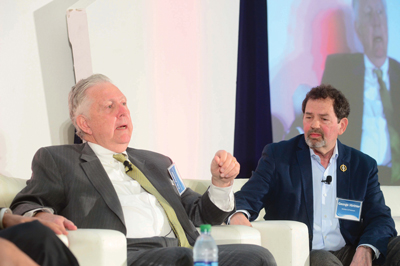The 1996 Summer Games in Atlanta were the first Olympics we covered at SportsBusiness Daily. I remember the mentally and physically demanding schedule of those three weeks in August, as a young and inexperienced staff worked out of an Alexandria, Va., office aggregating news and trying to make sense of the various angles related to the Atlanta Games.
The Games, which celebrate their 20th anniversary this year, have a complicated legacy. Many were critical of the commercial aspects around the event, and Olympic standard bearers maintained that Atlanta’s leaders were in over their heads in trying to present a global event. But in a day and age where it seems the Olympics are having an identity crisis with more and more cities not supporting efforts to host the event, the Olympics remain a source of great pride to the Atlanta community. The city’s leaders stress the long-term benefits of hosting the event 20 years ago this summer, as over 17 days in 1996, more than 2 million people went to Atlanta to experience the Olympic Games and the city truly became an international force in sports.
 |
A.D. Frazier and George Hirthler, key figures in Atlanta’s Olympic movement, say no host could replicate what the city did in 1996.
Photo by: BYRON E. SMALL / ATLANTA BUSINESS CHRONICLE |
It was great to meet and hear A.D. Frazier, the chief operating officer of the Atlanta Committee for the Olympic Games, who is now president of Georgia Oak Partners, and Hirthler & Partners CEO George Hirthler share stories about landing the Games and the legacy of the event. In an opening video, former Atlanta Mayor and ACOG co-Chairman Andrew Young said, “The Olympics, I think, came from God. The staff at City Hall was scared. They didn’t want anything to do with the Olympics because Montreal was still $700 million in debt from the ’76 Olympics. … But once we won the rights to hold the Games, everybody came on board.”
In a chat on stage, Frazier said he would hand out Olympic pins to flight crews when he was traveling around the world in the run-up to the Games. “I would spend my time handing these pins out to the passengers, and very frequently, passengers would say, ‘Ah, Atlanta. The city on the East Coast with the slot machines!’ I would say, ‘No, that’s Atlantic City. We’re Atlanta.’ So what happened was, the Olympics were truly a coming out party for our city and state. We were unknown in the sports world. We were unknown as a city with the infrastructure and facilities that could host a major world-class event in a world-class fashion. We had all the tools to pull this off, and it worked.”
He outlined ACOG Chief Executive Billy Payne’s vision to develop Centennial Olympic Park in downtown Atlanta, which proved to be transformative to the city. Olympic leaders used the Barcelona Games as an example to develop a nightly gathering place for thousands of people. “We developed a vibrant, central, core city,” Frazier said. “You have to remember just how sickly, how nasty, how ugly, how worthless downtown Atlanta was prior to 1996. It was an eyesore, people were leaving, people were streaming out.” But Olympic Park changed the city’s fortunes. “That, in my opinion, is the iconic symbol of Atlanta’s ability to transform itself in becoming great.”
Hirthler, who has served as lead writer or chief communications strategist for 10 international Olympic bid campaigns, stressed the legacy of the Olympics on the city, something he predicted people would never see again. “Atlanta’s extraordinary reuse of its venues after the Games should be an immense point of pride for everyone,” he said, noting that six of the eight Olympic venues are still in active use. He added, “I don’t think any city will be able to achieve what it did with the Olympics than what we achieved here in Atlanta.” Frazier also noted the legacy of the Games. “We spent $1.727 billion — all in private money. That, of course, will never happen again. But the scope of costs are so enormous today and they can’t do what we did. We used the Olympics money to build a ballpark, and everything else we did. The [International Olympic Committee] was really pretty unhappy about that, so they changed the host city contract so that can’t ever be done again. The economics are now fundamentally different.”
When asked if the city should make another run at an Olympics, Frazier was blunt. “We can do it again [host the Games], but I really don’t think we need to,” he said, and perhaps alluding to the lukewarm response the Games has received from some cities now, added, “I know the type of sacrificial effort that was made by so many people, to do whatever they could do, to make this work. You have to have that spirit, that all-in excitement, for it to work. But I don’t think you need to do it again.”
Big picture, the Games forever changed a Southern city. “The Olympics changed our image around the world,” Frazier said. “We are now seen around the world as a world-class sports and corporate center.”
There is a dramatically different economic model today, but I couldn’t help but think how the lessons and legacy from Atlanta run counter to the IOC’s current struggle to find cities willing to step up and host the Games.
Abraham D. Madkour can be reached at amadkour@sportsbusinessjournal.com.




